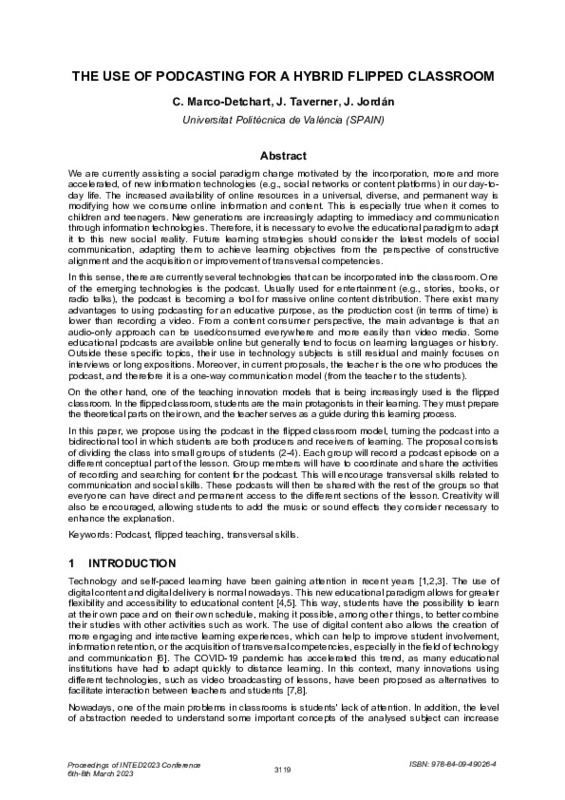JavaScript is disabled for your browser. Some features of this site may not work without it.
Buscar en RiuNet
Listar
Mi cuenta
Estadísticas
Ayuda RiuNet
Admin. UPV
The use of podcasting for a hybrid flipped classroom
Mostrar el registro sencillo del ítem
Ficheros en el ítem
| dc.contributor.author | Marco-Detchart, Cédric
|
es_ES |
| dc.contributor.author | Taverner-Aparicio, Joaquín José
|
es_ES |
| dc.contributor.author | Jordán, Jaume
|
es_ES |
| dc.date.accessioned | 2023-05-24T07:18:47Z | |
| dc.date.available | 2023-05-24T07:18:47Z | |
| dc.date.issued | 2023-03-08 | es_ES |
| dc.identifier.isbn | 978-84-09-49026-4 | es_ES |
| dc.identifier.issn | 2340-1079 | es_ES |
| dc.identifier.uri | http://hdl.handle.net/10251/193551 | |
| dc.description.abstract | [EN] We are currently assisting a social paradigm change motivated by the incorporation, more and more accelerated, of new information technologies (e.g., social networks or content platforms) in our day-today life. The increased availability of online resources in a universal, diverse, and permanent way is modifying how we consume online information and content. This is especially true when it comes to children and teenagers. New generations are increasingly adapting to immediacy and communication through information technologies. Therefore, it is necessary to evolve the educational paradigm to adapt it to this new social reality. Future learning strategies should consider the latest models of social communication, adapting them to achieve learning objectives from the perspective of constructive alignment and the acquisition or improvement of transversal competencies. In this sense, there are currently several technologies that can be incorporated into the classroom. One of the emerging technologies is the podcast. Usually used for entertainment (e.g., stories, books, or radio talks), the podcast is becoming a tool for massive online content distribution. There exist many advantages to using podcasting for an educative purpose, as the production cost (in terms of time) is lower than recording a video. From a content consumer perspective, the main advantage is that an audio-only approach can be used/consumed everywhere and more easily than video media. Some educational podcasts are available online but generally tend to focus on learning languages or history. Outside these specific topics, their use in technology subjects is still residual and mainly focuses on interviews or long expositions. Moreover, in current proposals, the teacher is the one who produces the podcast, and therefore it is a one-way communication model (from the teacher to the students). On the other hand, one of the teaching innovation models that is being increasingly used is the flipped classroom. In the flipped classroom, students are the main protagonists in their learning. They must prepare the theoretical parts on their own, and the teacher serves as a guide during this learning process. In this paper, we propose using the podcast in the flipped classroom model, turning the podcast into a bidirectional tool in which students are both producers and receivers of learning. The proposal consists of dividing the class into small groups of students (2-4). Each group will record a podcast episode on a different conceptual part of the lesson. Group members will have to coordinate and share the activities of recording and searching for content for the podcast. This will encourage transversal skills related to communication and social skills. These podcasts will then be shared with the rest of the groups so that everyone can have direct and permanent access to the different sections of the lesson. Creativity will also be encouraged, allowing students to add the music or sound effects they consider necessary to enhance the explanation. | es_ES |
| dc.description.sponsorship | The authors gratefully acknowledge the financial support of Consellería d'Innovació, Universitats, Ciencia i Societat Digital from Comunitat Valenciana and the European Social Fund (Investing In Your Future) (APOSTD/2021/227 and CIPROM/2021/077), the Spanish Ministry of Science (project PID2021-123673OB-C31) and the Research Services of Universitat Politècnica de València. Jaume Jordán is supported by grant IJC2020-045683-I funded by MCIN/AEI/10.13039/501100011033 and by "European Union NextGenerationEU/PRTR". | es_ES |
| dc.language | Inglés | es_ES |
| dc.publisher | IATED | es_ES |
| dc.relation.ispartof | INTED2023 Proceedings: 17th International Technology, Education and Development Conference, Valencia, Spain. 6-8 March, 2023 | es_ES |
| dc.rights | Reserva de todos los derechos | es_ES |
| dc.subject | Podcast | es_ES |
| dc.subject | Flipped teaching | es_ES |
| dc.subject | Transversal skills | es_ES |
| dc.title | The use of podcasting for a hybrid flipped classroom | es_ES |
| dc.type | Comunicación en congreso | es_ES |
| dc.type | Artículo | es_ES |
| dc.type | Capítulo de libro | es_ES |
| dc.identifier.doi | 10.21125/inted.2023.0863 | es_ES |
| dc.relation.projectID | info:eu-repo/grantAgreement///APOSTD%2F2021%2F227//MODELO DIFUSO PARA LA MEJORA DE LA INTERACCIÓN VISUAL EN ASISTENTES COGNITIVOS/ | es_ES |
| dc.relation.projectID | info:eu-repo/grantAgreement///CIPROM%2F2021%2F077//guardIA: GUArdian Personal Virtual en RealiDades SocIAles Hibridas/ | es_ES |
| dc.relation.projectID | info:eu-repo/grantAgreement/AEI//PID2021-123673OB-C31//SERVICIOS INTELIGENTES COORDINADOS PARA ÁREAS INTELIGENTES ADAPTATIVAS/ | es_ES |
| dc.relation.projectID | info:eu-repo/grantAgreement///IJC2020-045683-I//FALTA/ | es_ES |
| dc.rights.accessRights | Abierto | es_ES |
| dc.description.bibliographicCitation | Marco-Detchart, C.; Taverner-Aparicio, JJ.; Jordán, J. (2023). The use of podcasting for a hybrid flipped classroom. IATED. 3119-3124. https://doi.org/10.21125/inted.2023.0863 | es_ES |
| dc.description.accrualMethod | S | es_ES |
| dc.relation.conferencename | 17th International Technology, Education and Development Conference (INTED 2023) | es_ES |
| dc.relation.conferencedate | Marzo 06-08,2023 | es_ES |
| dc.relation.conferenceplace | Valencia, Spain | es_ES |
| dc.relation.publisherversion | https://doi.org/10.21125/inted.2023.0863 | es_ES |
| dc.description.upvformatpinicio | 3119 | es_ES |
| dc.description.upvformatpfin | 3124 | es_ES |
| dc.type.version | info:eu-repo/semantics/publishedVersion | es_ES |
| dc.relation.pasarela | S\486507 | es_ES |








